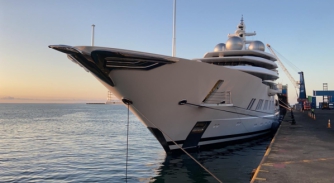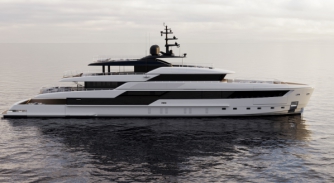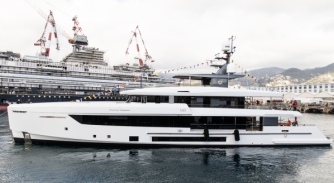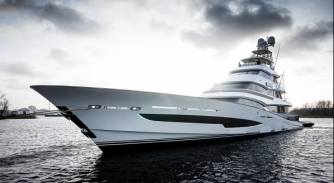The value of the lawyer
The approach to seeking advice needs to evolve, as does the perception of a lawyer’s role within the decision-making process…

Contract complexities, crew disputes, and insurance intricacies are all core reasons to value a lawyer as an ally in the decision-making process, rather than simply as a problem solver. This was the consensus of over 40 yacht managers, brokers, and legal representatives who attended The Value of The Lawyer event at Clyde & Co’s London headquarters, delivered by The Superyacht Agency and the renowned law firm.
The Superyacht Agency managed the guest list for Clyde & Co and crafted the value proposition and event structure for the delegates and attendees, allowing the law firm to deliver its message and build relationships with industry-leading decision-makers.
“What I want [attendees] to take from today is a set of principles that will remind you to pause and reconsider the consequences of closing a deal and signing a contract,” begins John Leonida, Brand Ambassador for Clyde & Co. “We must all consider the disclosure, or non-disclosure, of information and the obligations imposed on us all by the law.”
Joining the superyacht law veteran on the panel were a myriad of experienced maritime law heavyweights: Clyde & Co Partners Giovanna Cabbia, Mike Roderick, Rachel Cropper-Mawer, and Heidi Watson, Nicole McFarlane, Associate at the law firm, and The Superyacht Group’s Chairman and Editor in Chief, Martin Redmayne.
Considering the uncharted litigious minefield it has created, the legal complications associated with the Russian sanctions on regulatory frameworks were central to the discussions from the start. Whilst this has prompted more stringent approaches to Know Your Client (KYC) processes, it has also contributed to changing concepts that were once fundamental to legal practice, namely that you ‘could not pierce the corporate veil’. Previously, a company and individual were treated as completely different entities, which is seemingly no longer the case.
“This has evolved from some pretty significant terrorist acts around the world that have in turn led authorities to stretch the concept of the legal person, and ownership as well,” explains Cropper-Mawer. “What we are essentially looking at here from a criminal law perspective is who truly controls a company, who is the directing mind and owner of these different assets, or at least who ultimately owns them higher up the chain.”
A failure to conduct due diligence could result in a finding of complicity in trying to evade or circumvent sanctions or assisting someone to do so, and also other issues such as money laundering, and regulatory breaches. This can lead to significant fines, for individuals and corporations, but also for corporate criminal liability and, imprisonable offences. While these are extreme examples, understanding who the UBO is and where the money comes from is key to avoiding potential criminal liability and ensuring the integrity of the transaction.
This change has had its advantages, however. “I remember not so many years ago, whenever I inquired about a UBO and the source of the funds, it would upset the clients if not even offend them,” says Cabbia. “Now, luckily the situation has changed. Most of the time they anticipate that you will ask this and will have a KYC package ready to present to the lawyer. Brokers have also become very educated on the matter and understand the process and, and the risk that comes with failure to comply with these regulations.” The moment alarm bells should ring is when a client hesitates to provide a KYC package, she adds.
As the conversation moved on to the contracts that are drawn post KYC checks, Leonida asked the panel if there was a recurring issue that highlighted the gap between common sense and what the law dictates, namely looking at warranties. This is an important topic because it touches on the entire agreement clause along with detailed protocols. Parties often focus on negotiating hard commercial terms initially, but the bottom clauses become crucial in case of disputes. Judges refer to these clauses to interpret the parties' intentions.
“Let me emphasise the significance of a particular clause by reading its initial part: "The provisions of this clause shall replace and exclude any other liability, guarantee, or warranty of the build-up or any similar terms or conditions expressly stated or implied by law, custom, or otherwise else with respect to the most,” said Leonida. “This clause extinguishes all prior warranties and representations, oral or written, regarding the subject matter.”
One of the fundamental principles in English law is the freedom of contract. Parties have the liberty to decide their obligations with only a few restrictions imposed by principles like sanctions or certain regulations. It's crucial to understand that what's written in the contract is essentially the law, and judges won't reinterpret it unless there are specific circumstances. “However, in the UK legal system, there's legislation such as the Sale of Goods Act, specifically section 14, which presumes that goods sold should be free of defects, fit for purpose, and of satisfactory quality,” adds Cabbia. “If these provisions aren't excluded in the contract, they apply as implied terms, giving buyers recourse if the goods don't meet these standards after acceptance.”
The term satisfactory quality is entirely subjective and influenced by the owner or their team. Leonida asks panellists to consider a tangible item like a coffee machine; it's easier to define. However, when it comes to the Contractual Performance Obligation (CPO), why is it being excluded? Does the buyer have fewer or more rights?
“The example of the coffee machine might not be relevant here,” replies Cabbia. “When you purchase a coffee machine, if it doesn't work, you typically get a replacement. But with a yacht construction contract, it's different. The contract usually includes detailed provisions about supervision during construction, acceptance testing, and performance of equipment and machinery. The buyer has rights outlined in the contract, including inspection upon delivery and rectification of any defects before seeking a warranty.”
There are many opportunities for the buyer to communicate issues with the builder. When it comes to construction contracts, you can customise clauses to fit your needs, she adds. By excluding implied warranties, buyers can have more tailored clauses, which are preferable to relying on something vague. In construction projects, there are stages where adjustments can be made. If there are issues, discussions can be reopened.
Warranties for pre-owned yachts, on the other hand, usually have an entire agreement clause, which may include implied terms like ‘satisfactory quality’. However, the market often modifies terms and conditions, especially if the yacht is priced favourably and there’s a desire to finalise a deal quickly. All parties involved must scrutinise the contract to ensure it aligns with buyers’ expectations and doesn't overly restrict their rights. It ultimately depends on how the clauses are drafted and the extent of exclusions.
When it comes to the sale of goods, there are implied terms regarding satisfactory quality and fitness for purpose. Typically, second-hand yacht sales occur on an "as is" basis, meaning buyers get what they see, and they can't complain if issues arise later. To dissect these complexities and the subsequent arbitration that have resulted from different interpretations, McFarlane presented a case study of a ship sale, known as the Union Power case, where one of Clyde and Co’s partners represented the successful buyer.
“Shortly after taking delivery, the main engine failed, leading to a claim against the seller for breach of satisfactory quality. Surprisingly, the buyer's claim succeeded because the judge interpreted "as is" differently from what was expected, ruling that it didn't sufficiently exclude implied terms,” she explains.
“Interestingly, the judge suggested that if ‘as is, where is’ had been used, the buyer couldn't reject the ship for breach but could still claim damages for breach of satisfactory quality and fitness for purpose. This decision was unexpected and controversial, deviating from industry expectations.”
Another case, involving a pre-owned 45 metre Benetti yacht, had a similar engine breakdown shortly after delivery. The buyer faced significant repair costs, nearly half the value of the entire yacht. The judge presiding over this case, however, had a very different view. The judge's view was that ‘as is’ indicates the condition of the yacht at the time of purchase, with no recourse for damages if discrepancies are found. This interpretation distinguishes between the right to reject and the right to claim damages, suggesting that ‘as is’ excludes the former but not the latter. Ultimately, the judge said that such an interpretation seems unlikely to align with the expectations of ordinary business people and more to the interpretation of an ingenious lawyer.
“What the judge said, reflected what the market was saying in response, to Union Power,” adds Leonida. “When our colleagues won the case, it flipped ‘as is where is’ on its head. Thankfully in the case of the Benetti, it has reverted back.”
As the panel discussed yacht insurance and its approach to terms such as ‘warranty’, Roderick highlights that the term itself holds a specific meaning rather than being open to interpretation and clauses. Warranties may include ‘private pleasure only’ or ‘charter use’ warranties, ensuring owners adhere to specified conditions. If breaches of these occur, English law perspectives on this have recently changed with the introduction of the Insurance Act in 2015, with the definition being marked as “an agreement by the insurer that some particular thing shall be done or not done. Some conditions shall be fulfilled. The insured affirms or negatives the existence of a particular state of facts.”
“Then going back to sanctions, in an insurance policy, there are standard sanctions clauses that are prevalent in the market,” continues Roderick. “One notable clause is referred to as "change 2020 009," issued by the Joint Code Committee, and another common one is the LME 3100. These clauses outline specific provisions regarding sanctions issues. For instance, if an owner is designated under sanctions, the insurer's obligations under the policy are suspended for the duration of the sanctions period. This means the insurer cannot accept premiums, process claims, pay claims, or renew policies during this time.”
Legal processes within the crew side of the industry have also evolved, especially concerning the Maritime Labour Convention, which lays a solid foundation for employee rights. However, despite this progress, employment issues can still be intricate. The global nature of yacht ownership, management, and crew nationality, along with the vessel's flag, present both challenges and opportunities in addressing employment matters. Each jurisdiction within this framework has its own laws governing dismissal, employee treatment, discrimination, harassment, and bullying claims.
This complexity often deters crew from pursuing claims due to a lack of knowledge and resources to navigate legal systems, and the Maritime Labour Convention doesn't grant individual crew members the right to directly sue their employer or yacht owner. Despite these challenges, Watson highlights that there is a trend towards adopting a highest common denominator approach, seeking advice from developed jurisdictions on managing crew-related issues such as bullying, harassment, and dismissal decisions.
“Some people say that yachting has been experiencing a ‘Me Too’ movement over the past few years, with an increasing willingness to report instances of sexual harassment, rather than instances actually rising,” she says. “However, dealing with bullying and harassment has historically been inadequately addressed, even within the framework of the maritime convention. While the issue was acknowledged in the 2019 amendments to the convention, it primarily focused on health and safety concerns rather than addressing the root causes of workplace harassment.”
Despite resolutions and calls for more guidance on this matter, progress has been slow. Nonetheless, organisations such as the International Chamber of Shipping have provided valuable guidance on implementing policies and procedures to address bullying and harassment effectively. “It's crucial for employers to establish clear policies and protocols to address and prevent such behaviour, ensuring a safe and respectful working environment for all crew members,” adds Watson.
The overall consensus from both panellists and attendees towards the end of the event was that the approach to seeking advice needs to evolve, whether it be in the initial stages of new build contracts, insurance policies, crew disputes, or a second-hand yacht sale. Redmayne explains that when individuals seek professional advice, they often default to traditional channels through captains or brokers. However, there's an opportunity to shift this mindset towards viewing lawyers as partners in decision-making rather than just problem solvers.
“As we professionalise our marketplace, there's an opportunity to rethink how we approach guidance and decision-making within our advisory networks,” he adds. “It's about portraying lawyers as allies, not adversaries.”
Profile links
NEW: Sign up for SuperyachtNewsweek!
Get the latest weekly news, in-depth reports, intelligence, and strategic insights, delivered directly from The Superyacht Group's editors and market analysts.
Stay at the forefront of the superyacht industry with SuperyachtNewsweek
Click here to become part of The Superyacht Group community, and join us in our mission to make this industry accessible to all, and prosperous for the long-term. We are offering access to the superyacht industry’s most comprehensive and longstanding archive of business-critical information, as well as a comprehensive, real-time superyacht fleet database, for just £10 per month, because we are One Industry with One Mission. Sign up here.
Related news

US aims to sell Amadea
Amadea could be sold by the US government as it looks to free itself from a seven-figure maintenance bill
Fleet
.jpg)
Baglietto: exploring tradition
We catch up with Fabio Ermetto in Milan to discuss Baglietto’s two new yacht lines, changing construction trends and the stability of the market
Fleet

Sanlorenzo: orders slow but revenues grow
With signs of the market descending from the highs of the new-build boom, the shipyard’s financial position remains healthy as it eyes future investments
Business

All systems are Go
Tankoa Yachts’ first sub-50 metre semi-custom yacht from its T450 series has hit the water in Genoa after three years of construction
Fleet

World’s largest sport fisher set to debut
One of Royal Huisman’s most iconic and ambitious projects to date is on its way to Amsterdam ahead of its final launch
Fleet

Superior project management tools for refit shipyards
Pinpoint Works’ dynamic and customisable interactive worklist management platform is fast becoming the industry’s go-to communication solution
Crew
Related news
US aims to sell Amadea
1 year ago
Baglietto: exploring tradition
1 year ago
Sanlorenzo: orders slow but revenues grow
1 year ago
All systems are Go
1 year ago
World’s largest sport fisher set to debut
1 year ago
NEW: Sign up for
SuperyachtNewsweek!
Get the latest weekly news, in-depth reports, intelligence, and strategic insights, delivered directly from The Superyacht Group's editors and market analysts.
Stay at the forefront of the superyacht industry with SuperyachtNewsweek



